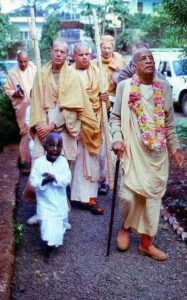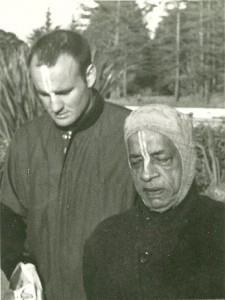Submitted by: Narasimha Dasa
Biogenesis and the Birth of Modern Science
By Narasimha das
The ancient Greeks, specifically the renowned philosopher Aristotle (384 B.C – 322 B.C.), believed that living things were spontaneously generated from non-living matter. Aristotle was a naturalist who loved to observe animals and nature while taking long walks through the country. He noticed that ponds were full of various species, such as fish, frogs and tiny swimming insects. Later, in the summer months, many of these ponds would dry up and appear to become lifeless mud sinks or totally dry beds. But when the rains came, the same dry beds would fill up again with aquatic life. He wondered how all this life became regenerated. After pondering this puzzle for a long while, he finally concluded that earth itself had the power to generate life spontaneously with water and air under certain conditions. Observing the life cycles of insects on land, he came to similar conclusions: that rotting meat, animal fur and other non-living matter had the potency to generate various forms life under certain conditions.
Aristotle was considered one the greatest thinkers of his era, so naturally his published findings circulated to nearby Arab countries, and gradually such misleading ideas spread west to European nations. Such misinformation gradually evolved into a system of superstitions and beliefs that were taught in school texts on biology and medicine.
Due, perhaps indirectly, to the liberating influence of the advent of Sri Chaitanya Mahaprabhu on Earth, Europe started to slowly emerge from the Dark Ages. During the Dark Ages people had no idea how or why deadly diseases like the black plague were spread. City people would pass stool and urine in buckets and then throw it out their townhouse windows while yelling a warning to pedestrians, “Loo!” (This is how the term “loo” came to mean toilet or latrine.) Some streets were, at times, ankle deep in human excrement. Surgeons had no idea of any need for cleanliness. In fact doctors would often wear their most filthy clothes to perform surgeries, using unwashed scalpels, just as field workers and street cleaners would wear filthy clothes for their work, saving their clean clothing for social affairs. Thus most patients would “mysteriously” die shortly after even routine surgeries.
William Harvey (1578-1657) became famous for his discovery that blood circulates through the body in veins and blood vessels. In one of his writings, he mentioned that it was possible that insects may lay eggs that were too small to see with the naked eye. The glimmer of light from this suggestion inspired and motivated another early scientist, Francisco Redi (1626-1697) to investigate further. Soon he became convinced that the prevailing theories of his day were ill-conceived. He demonstrated through experiments that life could not be generated spontaneously from non-living matter. He concluded that such conjectures had no scientific basis. He boldly propounded his views that life was generated not spontaneously from dead matter but from living organisms, some which were too small to be seen with the naked eye or which laid eggs too small to be seen. People of his day were stunned by this fantastic new theory involving invisible creatures. Aristotle had been highly regarded in the West for centuries as one of the greatest thinkers and naturalists of all time. So people wondered, “How could Aristotle have been so wrong?”
To prove his theory, Redi devised several interesting experiments to demonstrate that life comes from life, and this was the birth of modern science, which relies on controlled observations and experiments to demonstrate the truth or fallacy of theories like Redi’s and Aristotle’s. Redi’s experiments gave rise to modern-day knowledge regarding food preservation and sanitation. He had demonstrated in a number of ways that life is generated only from other living things and that non-living matter had no power to generate life on its own. Scientists then began forming groups for the sake of exchanging their findings derived through various means of experimentation and observation. Redi and his followers strongly propounded their new understanding known as biogenesis, which establishes that life arises only from previously existing life and not from non-living matter.
A major breakthrough came when a humble lens grinder, Antonio Van Leeuwenhoek (1632-1723) refined his art with the help of a renowned spectacle maker. He learned how to grind precision magnifying lenses and how to achieve further magnification by stacking lenses in a tube. In this way he created the first known microscope. With his microscope he was able to observe microbes for the first time, and this led to many new discoveries. At first other scientists were doubtful about the existence of microbes because they were unable to match the precision and power of Leeuwenhoek’s microscopes.
Soon Leeuwenhoek’s discoveries of microbes were verified by other scientists, yet many scientists clung to their belief that microbes themselves were spontaneously generated from non-living substances. Aristotle had taught that non-living substances can create life under certain conditions, and this widely accepted belief had been around for centuries.
Long held beliefs don’t die easy. Indeed, many scientists challenged the idea of biogenesis for another 150 years. In the latter part of the nineteenth century, a member of the French Academy of Sciences, Dr. Pouchet published a compelling book that attempted to reaffirm the idea that micro-organisms were spontaneously generated from non-living matter. His book was highly lauded by scientists worldwide. Dr. Pouchet’s findings didn’t go unchallenged for long. Soon Louis Pasteur read Pouchet’s book and wrote to him explaining several discrepancies in his methods, findings and conclusions. Pasteur was considered one of the top scientists of his times, especially in France, and he is still considered one the most important scientists of the modern age. Pasteur strongly refuted Pouchet’s ideas through a series of experiments and debates. The scientific community and general public were divided in their opinion on this issue. Many challenges and counter-challenges went back and forth and gave rise to varieties of experiments under careful controls.
Both Pouchet and Pasteur were experts in conducting experiments, and their efforts created the modern era of controlled experimentation and observation. They both refined and adjusted their experiments to demonstrate their theories, and this went on for several months or even years under the scrutiny of a special commission appointed by the French Academy of Sciences. At first the Commission was divided in its opinion, but soon they accepted Pasteur’s conclusions and bestowed upon him the Academy Award for science (circa 1865). This was a high honor like the Nobel Prize, and many people, especially in France, recognized Pasteur as the greatest scientist in the world. Louis Pasteur became widely popular and famous, and Pouchet faded from the limelight.
Pasteur’s discoveries proving biogenesis and disproving spontaneous generation led to many new breakthroughs in medicine, food preservation, disease control, sanitation and other fields. He had proven that life comes from life and not from non-living matter. Without his discoveries through controlled experiments, science might have remained much longer in the dark ages of superstition, myth and foolish conjectures.
But the new age of enlightened science in the realm of biology didn’t last long. Biological sciences suddenly embraced the darkness of superstition yet again with the publication of The Origin of Species by the infamous Charles Darwin, a clever fellow commissioned by biased atheists who wanted to squash the idea of God and religion through the use of wild speculation under the guise of scientific observation. Darwin himself doubted his own hypothesis, which was more outlandish than most prior superstitions. Darwin’s ideas have led to the now popular belief among scientists and academia that microbes were originally generated from non-living matter and then gradually evolved to higher life forms spontaneously due to accidental genetic mutations and the process of natural selection. Thus modern biology has embraced a dark fog that’s more dangerous than any myth that came before.
Darwin’s weak hypothesis regarding the origin of species has no basis in scientific theory and can’t be demonstrated by any sort of experimentation or observation. It is unfounded and preposterous and flies in the face of common sense. Yet due to a calculated system of indoctrination in academia and media, school kids, like those from the dark ages, are taught this foolish conjecture in the name of education and science.
In the Kali Yuga, there is no real science for the liberation of consciousness, save and accept the science of Krishna consciousness and the chanting of the Holy Names of God. Modern science, by its very nature, is bound by ignorance, illusion and doubt. Lord Krishna’s material energy is very difficult to understand and overcome. God’s power of illusion forever overwhelms everyone who fails hear from authority and chant the Holy Names of God.
“Those who are thus bewildered are attracted by demoniac and atheistic views. In that deluded condition, their hopes for liberation, their fruitive activities, and their culture of knowledge are all defeated.” (BG.9.12)
“This divine energy of Mine, consisting of the three modes of material nature, is difficult to overcome. But those who have surrendered to Me can easily cross beyond it.” (BG.7.14)
“Those miscreants who are grossly foolish, lowest of mankind, whose knowledge is stolen by illusion, and who partake of the atheistic nature of demons, do not surrender unto Me.” (BG.7.15)
“The next class of duskritina [miscreant] is called mayayaprahrita-jnana, or those whose erudite knowledge has been nullified by the influence of illusory material energy. They are mostly very learned fellows—great philosophers, poets, literati, scientists, and so on—but the illusory energy misguides them, and therefore they disobey the Supreme Lord.” (BG.7.15, Puport)



